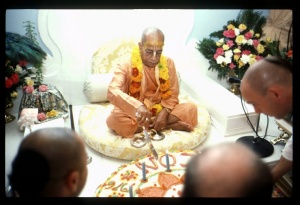SB 1.19.17 (1965)

A.C. Bhaktivedanta Swami Prabhupada
TEXT No. 17
- Iti sma raja adhyavasaya yuktah
- Prachina mulesu kusesu dheerah
- Udanmukham dakshina kuta aste
- Samudra patnya swa suta nasta bharah.
ENGLISH SYNONYMS
Iti—thus, Sma—as in the past, Raja—the king, Adhyavasaya—perseverance, Yuktah—being engaged, Prachina—eastern, Mulesu—on the root, Kusesu—on seat made of kusa straw, Dheerah—self controlled, Udammukham—facing the northern side, Dakshina—on the southern, Kula—bank, Aste—situated, Samudra—the sea, Patnya—wife of (the Ganges), Swa—own, Suta—son, Nasta—given over, Bharah—the charges of administration.
TRANSLATION
Maharaj Parikshit was perfectly self controlled and as such thus he situated himself. He sat down on the seat of straw with roots towards the east placed on the southern bank of the Ganges, facing himself on the northern side and previously having given the charge of administration on his son.
PURPORT
The river Ganges is celebrated to be known as the wife of the sea. The seat of Kusa straw is considered to be sanctified if the straw is taken out of the earth complete with root and the root side kept towards eastern direction is considered to be auspicious. Facing the northern side is still more favorable for attaining spiritual success. Maharaj Parikshit handed over the charge of administration to his son before his leaving the home. He was thus fully equipped for all favorable conditions.